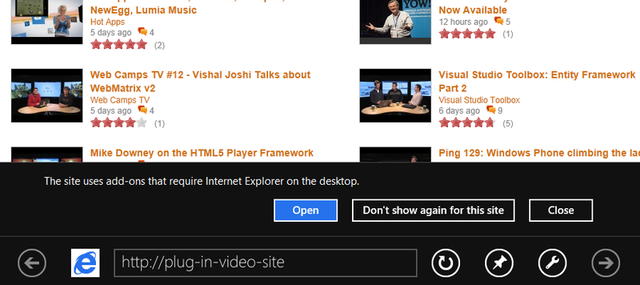
Microsoft's new version of Internet Explorer has barred browser plugins in the Metro environment. But Microsoft has revealed a method that plugin-dependent websites can use to leap over Metro's walls and reach the green fields of the conventional Windows desktop, where Flash is still allowed to roam free.
The relevance of proprietary browser plugins is declining as standards-based Web technologies mature. Native Web technologies don't yet supply complete functional equivalence with the capabilities of plugins, but the open Web has the advantage of greater ubiquity.
There are a growing number of mobile devices and computing environments where modern Web standards are supported, but plugin-based technologies like Flash are not. The proliferation of platforms and devices, including some that are locked down like appliances, has made it difficult for plugin vendors to keep up and reach every screen.
The ubiquity of native Web standards over proprietary plugins is set to get a major boost from Microsoft with the launch of Windows 8 and Internet Explorer 10. As we have previously reported, the next major version of Microsoft's Web browser will not display plugins in the Metro environment, which will be the default shell in Windows 8.
Microsoft has published a series of posts in its official IE development blog that discuss the implications of this change and what it means for users and Web developers. In a new post published this week, IE program manager lead John Hrvatin highlighted the advantages of plugin-free browsing and emphasized the need for Web developers to start supporting users who browse in environments that don't have plugins enabled.
"The transition to a plug-in free Web is happening today. Any site that uses plugins needs to understand what their customers experience when browsing plugin free. Lots of Web browsing today happens on devices that simply don't support plugins," he wrote. "Metro style IE runs plug-in free to improve battery life as well as security, reliability, and privacy for consumers."
A growing number of websites that rely on browser plugins already offer a standards-based fallback for users who are browsing on popular plugin-free devices such as as the iPhone or iPad. Microsoft has previously discussed some of the steps it is taking to ensure that those websites serve their plugin-free content to Metro users.
There will still likely be many Flash-heavy websites, however, that can't accommodate users who are browsing without plugins. In the blog post, Hrvatin explained that such websites can ask the user for permission to jump to the conventional Windows desktop and launch the windowed version of Internet Explorer, which will have full support for plugins.
Web developers can get the browser to display the prompt by including the special requiresActiveX=true property in an X-UA-Compatible meta tag or HTTP header. Hrvatin cautions that this feature is included for transitional purposes and is intended to serve as a last resort. The preferred behavior is still for Web developers to display a plugin-free version of their site to users who are browsing in the Metro environment.
Listing image by Image courtesy of Microsoft
reader comments
84